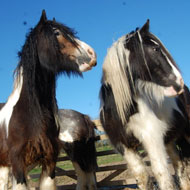
Charity sees 30 per cent rise in the number of horses and ponies coming through its doors
Blue Cross has reported a 30 per cent in the number of horses and ponies coming through its doors this year, stretching its centres to bursting point.
An admission of 60 horses and ponies in the first three months of 2014 has put pressure on resources and resulted in some centres becoming over-full.
Fifty-one of these are cobs who were found abandoned and neglected, but with the potential to become versatile riding horses.
Many are ready to be backed, and the charity is seeking assistance from owners with the knowledge and facilities to provide homes for some of these smart youngsters.
The cobs, many of which are bay, skewbald and piebaled, range from 13hh upwards, and are aged from two years old. They are ready for new homes where they can continue their training and fulfil their potential. Finding homes for these horses will free up space at Blue Cross centres for more urgent welfare cases requiring immediate help.
Vicki Alford, horse manager at Blue Cross Burford said: “We are seriously struggling with space and resources at the moment. This means we can’t easily give the horses that are ready to progress the time and training they need. Most of these cobs have good conformation, movement and temperaments.
"We have laid the foundations for their initial handling and training and are now offering knowledgeable riders a great opportunity to take on a calibre youngster that they can have the satisfaction of backing and bringing on themselves.”
Horse welfare is an escalating crisis in the UK, with an estimated 7,000 horses and ponies currently at risk. This puts pressure on horse charities across the country in terms of funding and resources.
If you think you have the time and the facilities to provide one of these horses with a good home, or to make a donation to the Blue Cross, visit their website.



 The Federation of Independent Veterinary Practices (FIVP) has announced a third season of its podcast, Practice Matters.
The Federation of Independent Veterinary Practices (FIVP) has announced a third season of its podcast, Practice Matters.